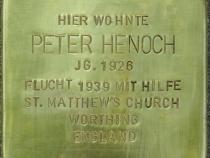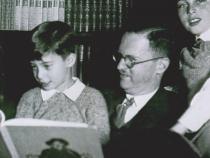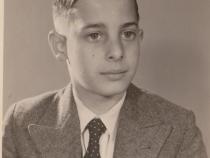Location
Fasanenstr. 32
District
Wilmersdorf
Stone was laid
13 July 2019
Born
06 June 1926 in Berlin
Escape
1939 mit Hilfe der St. Matthew’s Church in Worthing
Survived
Ernst Peter Henoch was born in Berlin on 6 June 1926, the younger of two sons of Johann Eduard Henoch (1887-1941) and Lilli Therese Aufseesser (1899-1935).
His father “Eddy” was a businessman whose company made office equipment. The family lived in several different apartments in Wilmersdorf-Charlottenburg; they moved to Fasanenstr 32 after Lilli’s early death on December 31,1935.
After his mother’s death, Peter spent much of his free time staying with his aunts and cousins. On weekends, the family went to operetta, or the zoo, and took walks in the Grunewald.
Peter and Rolph left for England from Tempelhof Airport on January 8, 1939.
Peter’s emigration was the result of a lucky coincidence and quick action by his Aunt Frieda. She was in London when she saw a newspaper article about how members of St Matthew’s Church, Worthing had decided to adopt a German Jewish child. She immediately got in touch and persuaded them to take Peter. Worthing Refugee Committee also sponsored Rolph’s entry visa, though there were not enough funds to support both boys.
Transplanted to a small town on the south coast of England, Peter found himself living a puzzlingly different life, surrounded by elderly churchgoers and bullied at boarding school for his poor English.
Peter eventually found a stable home with Miss Mary Maynard, the Secretary of Worthing Refugee Committee, and stayed with her during school holidays. His father’s letters ceased in 1941 after German troops captured Riga, where he had gone to escape the Nazis.
Peter enjoyed lessons and soon started to do well, though he was always under immense pressure, constantly needing to win scholarships to continue his education. He eventually won a scholarship to Cambridge University and became a professional historian.
First, however, he volunteered for Army service as soon as he left school. As the army required German refugee volunteers to Anglicize their names, he became Peter Hennock.
Peter met Elspeth Rodger, a Scottish woman, in the Christian Union at Cambridge. Peter had become a sincere Christian, and his religion remained important to him for the rest of his life. They married in 1954 and had three children - John, in 1957, Mary in 1958, and Martin in 1960.
Peter enjoyed teaching at Sussex University during the 1960s when it pioneered inter-disciplinary studies. Later he moved to Liverpool University as professor of history and head of department. Peter never fully stopped working. He published a comparative history of the British and German welfare systems when he was 80.
He separated from Elspeth around 1980. Later, he began a second relationship with Elisabeth Zuckerman, another former refugee, who was originally from Vienna. He adored being part of her extended family of two adult daughters, five grandchildren, and several great grandchildren. Peter also had four grandsons as John and Martin each had two boys.
Peter and Elisabeth were together for 24 years till her death in 2004. They both loved music and spent hours listening to Mozart, Beethoven, Bach and Schubert together. Their shared cultural roots were a huge part of their relationship, and something they celebrated.
Peter died on 10 September 2012, aged 86.
His father “Eddy” was a businessman whose company made office equipment. The family lived in several different apartments in Wilmersdorf-Charlottenburg; they moved to Fasanenstr 32 after Lilli’s early death on December 31,1935.
After his mother’s death, Peter spent much of his free time staying with his aunts and cousins. On weekends, the family went to operetta, or the zoo, and took walks in the Grunewald.
Peter and Rolph left for England from Tempelhof Airport on January 8, 1939.
Peter’s emigration was the result of a lucky coincidence and quick action by his Aunt Frieda. She was in London when she saw a newspaper article about how members of St Matthew’s Church, Worthing had decided to adopt a German Jewish child. She immediately got in touch and persuaded them to take Peter. Worthing Refugee Committee also sponsored Rolph’s entry visa, though there were not enough funds to support both boys.
Transplanted to a small town on the south coast of England, Peter found himself living a puzzlingly different life, surrounded by elderly churchgoers and bullied at boarding school for his poor English.
Peter eventually found a stable home with Miss Mary Maynard, the Secretary of Worthing Refugee Committee, and stayed with her during school holidays. His father’s letters ceased in 1941 after German troops captured Riga, where he had gone to escape the Nazis.
Peter enjoyed lessons and soon started to do well, though he was always under immense pressure, constantly needing to win scholarships to continue his education. He eventually won a scholarship to Cambridge University and became a professional historian.
First, however, he volunteered for Army service as soon as he left school. As the army required German refugee volunteers to Anglicize their names, he became Peter Hennock.
Peter met Elspeth Rodger, a Scottish woman, in the Christian Union at Cambridge. Peter had become a sincere Christian, and his religion remained important to him for the rest of his life. They married in 1954 and had three children - John, in 1957, Mary in 1958, and Martin in 1960.
Peter enjoyed teaching at Sussex University during the 1960s when it pioneered inter-disciplinary studies. Later he moved to Liverpool University as professor of history and head of department. Peter never fully stopped working. He published a comparative history of the British and German welfare systems when he was 80.
He separated from Elspeth around 1980. Later, he began a second relationship with Elisabeth Zuckerman, another former refugee, who was originally from Vienna. He adored being part of her extended family of two adult daughters, five grandchildren, and several great grandchildren. Peter also had four grandsons as John and Martin each had two boys.
Peter and Elisabeth were together for 24 years till her death in 2004. They both loved music and spent hours listening to Mozart, Beethoven, Bach and Schubert together. Their shared cultural roots were a huge part of their relationship, and something they celebrated.
Peter died on 10 September 2012, aged 86.






